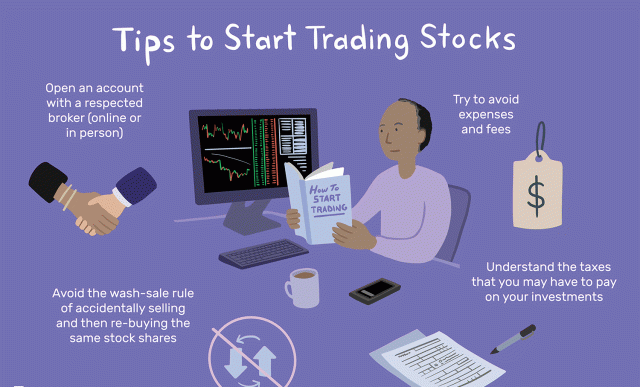How to Trade Properly
By Dumb Little Man
January 10, 2024

The current pandemic outbreak and its economic consequences are resulting in a variety of high-probability trading opportunities. These opportunities do not come along very frequently, but when they do, they may help you generate money in a record amount of time, assuming you know what you are doing.
Things To Know About Stock Trading
Stock trading is a type of investment in which short-term earnings are prioritized above long-term advantages. It is dangerous to jump in without knowing what you are doing. Trading entails attentively monitoring the short-term price movements of several stocks and then attempting to purchase cheap and sell high. Before you sell, traders normally settle on the percentage rise they are seeking for.
While trading provides a lot of potential for quick profits, it also has a lot of danger since a stock may not recover from a downswing in the time period you want it to and may even decline in price more.
Furthermore, frequent trading might be costly since you may have to pay broker fees each time you purchase or sell. Any profits you earn on a stock you have not owned for a year or longer are taxed at the same rate as your ordinary income, not at the reduced long-term marginal rate.
Learn When and How to Buy Stocks

It is worth the time and effort to learn how to buy stocks before you start trading. Stocks have been shown in research after study to be one of the fastest methods to build wealth.
Learning how to trade stocks entails becoming knowledgeable about the different elements that influence stock values, such as business and financial factors, corporate financials, and stock market patterns. It also entails comprehending the hazards associated with learning how to trade stocks and determining which stock market categories are best suited to your specific requirements.
When it comes to learning how to trade stocks, there are many choices. Those choices might be daunting for beginner stock traders, so it is a fine decision to empty the cards and ensure you're economically prepared to trade stocks without diversions.
Are You New to Stock Trading?
If you are new to stock trading, keep it simple by investing in a diverse combination of low equities to achieve long-term achievement.
Make a Trading Budget That You Should Strictly Follow
A budget allows you to ensure that you will have sufficient funds each month. You may run out of cash before your next payday if you do not have a budget in place. A budget outlines how much profit you make and where it goes. Even if you have a skill for stock trading, investing more than 10% of your investment in specific equities might put your money at risk. However, this isn't the sole guideline to follow when it comes to risk management. Only put money into investments that you can afford to lose.
Use a Simulated Trading Account to Practice
Most seasoned traders may use trade simulations to experiment with more complex strategies without risking their money on an unproven market move. Virtual trading tools provided by several online stock brokers provide investors with hands-on, low-pressure experience. Customers may use paper trading to practice their trading skills and develop a track record before risking real money.
Virtual trading is available from a number of firms.
Maintain Your Attitude When Getting Into Trading
Finding the next major breakthrough stock before anyone else is not necessary to be a savvy trader. Many skilled traders have undoubtedly already heard that a stock is primed for a surge by the time you hear it, and the potential has probably now been placed into the market. Even if it is too late to earn a fast buck, it does not imply you are too late for the party. Great investments continue to provide shareholder value for years, which is a compelling justification for approaching active investing as a hobby rather than a last-ditch effort to make quick money.
Learn Trading Strategies
A trading strategy is a way of purchasing and selling assets that is based on a systematic approach. A trading strategy is a set of rules and criteria that are used to make trading choices. A trading strategy can be basic or sophisticated, and it should take into account factors like investment type. The important thing is to develop a trading strategy based on objective facts and research and stick to it. Similarly, if market circumstances or personal goals change, a trading strategy must be re-evaluated and changed on a regular basis.
A trading strategy is a well-thought-out investment and plan that outlines investing goals, risk level, scope, and tax consequences. Proposals and best practices must be explored, embraced, and then followed. Trading strategy includes establishing procedures for trading stocks and other investments, as well as more complicated trades like options and futures. Working with a broker or broker-dealer to place trades entails identifying and controlling trading costs such as spreads, charges, and fees. Trading positions are watched and managed after they have been completed, including altering or closing them as appropriate. Risk and return are calculated, as well as the impact of trades on the investment and tax consequences.
Learn to Read Stock Charts
How to read stock charts? Do you find them ambiguous? Well, they are not. You must be able to read stock charts if you plan to actively trade equities as a stock market investor. Even traders who mostly employ basic research to choose companies to invest in utilize trading strategies of stock prices to establish particular buy or entry, and sell, or exit points. Stock charts may be found for free on websites like Google Finance. Clients have access to stock charts at all times while dealing with stock brokerages. To summarize, you should have little problem locating stock charts to study.
Bar charts, candlestick charts, line charts, and point and figure charts are all examples of stock charts. Almost all stock charts allow you to move among several styles of charts as well as display different technical indicators on the chart. You may also change the time window that a chart displays. While daily charts are the most popular, daily, weekly, monthly, year-to-date, 5-year, 10-year, and a stock's whole historical lifespan are also accessible. Using different chart creation approaches and different time intervals for analysis has relative advantages and downsides. You can only find out what approach and time frame will work best for you as an individual analyst or investor by actually practicing stock chart analysis. Any stock can provide useful information about future stock price movement.
Frequently Asked Questions – FAQs
Q1. What is trading?
Buying and selling shares through the Web or by other digital communication like wireless connections and other modern technologies is referred to as trading. Customers typically visit a brokerage firm's Web site through their usual Internet Service Provider while trading online. Customers can examine the material on the Web Site and connect to their accounts to place orders and track account activity once they have arrived.
Q2. How can you open my trading account?
Many brokerage firms allow you to create an account online but your account will not be operational until the brokerage business receives and processes a signed application from you. It is worth noting that some businesses accept electronic signatures, while others insist on a physically signed form. Some companies will collect basic account information via their websites, then mail you a pre-filled application to sign and return. Please double-check with your brokerage business for details on particular requirements.
Q3. How Risky is Trading? Are There Any Risk Factors Involved?
Investment in stocks, regardless of the strategy utilized, has the risk of loss. Before entering the market, stockholders must first grasp the fundamentals of investing, their individual risk tolerance, and their investment objectives. These other dangers should also be considered by internet investors. Online investors' ability to access their accounts or send orders may be hampered by heavy Internet traffic. Stock advice and ideas given in chat rooms or bulletin boards should be viewed with caution by online investors. Before acting on these suggestions, investors should conduct their own investigation. Additionally, some internet investors may be tempted to “overtrade” by trading too frequently or impulsively without regard for their investment objectives or risk tolerance. Overtrading can have a negative impact on investment performance, increase trading expenses, and make your tax situation more complicated.
With trading properly, you can learn about the things about trading that can help you leverage it.
Conclusions
Money Sounds Fascinating To Everyone
The concept of money might sound fascinating to anyone, and one should definitely find ways to increase their assets. Trading can increase your wealth amazingly if you do it carefully. But before jumping in you need to learn it and develop your concepts and follow different strategies. There is this famous saying ‘ ‘take the risk or lose the chance' ‘ so if you never get involved in it you will never find it out.
How long have you been in the trading field? Do you make any profits? What are the strategies that you have followed? Share with us.
Dumb Little Man
At Dumb Little Man, we strive to provide quality content with accuracy for our readers. We bring you the most up-to-date news and our articles are fact-checked before publishing.


